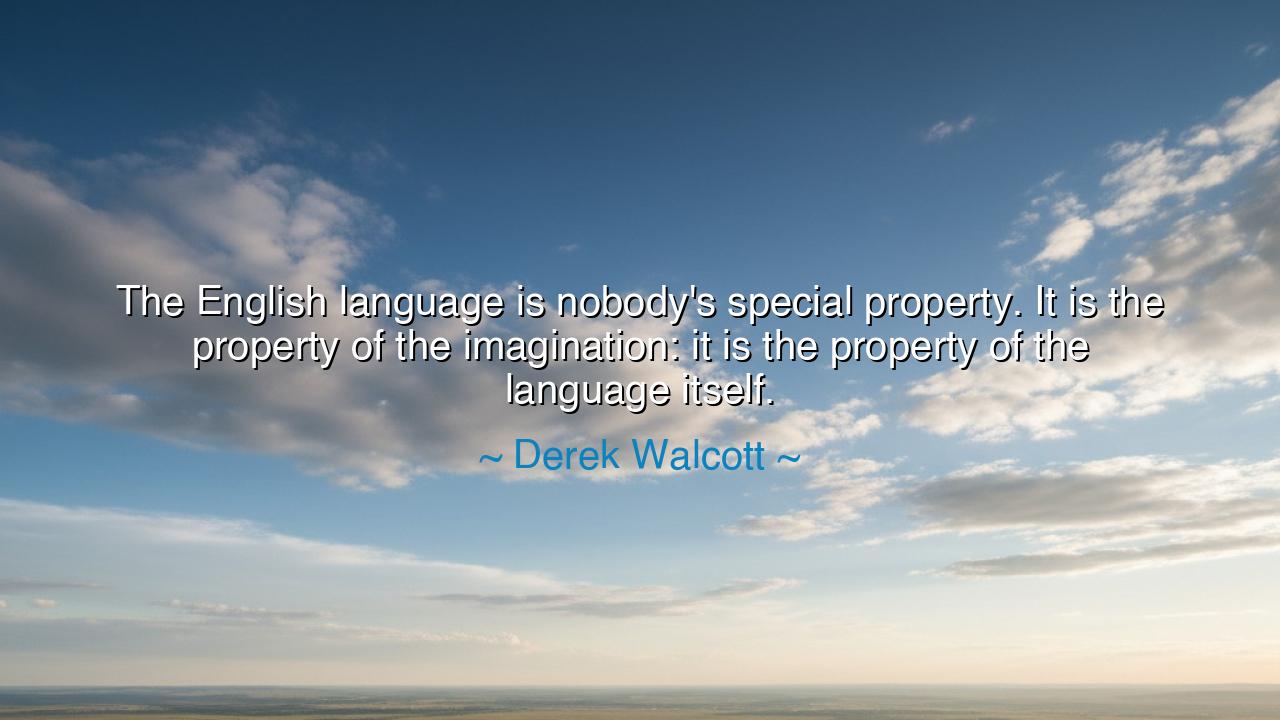
The English language is nobody's special property. It is the
The English language is nobody's special property. It is the property of the imagination: it is the property of the language itself.






In the majestic and liberating words of Derek Walcott, poet of islands and interpreter of oceans, we hear a truth that transcends borders and binds humanity in the shared current of creation: “The English language is nobody’s special property. It is the property of the imagination: it is the property of the language itself.” These words are not a mere defense of speech, but a song of freedom — a declaration that no empire, no nation, no single people can own the living river of language. For language, like the sea, belongs to those who sail it. It flows where the imagination commands, taking new shapes, new sounds, new meanings with every generation that dares to speak.
Derek Walcott, born in Saint Lucia, lived in the meeting place of histories — where the tongues of colonizers met the songs of the enslaved, and out of suffering and survival, new voices rose. English was the language of power, but it became, in his hands, a language of renewal. When he spoke these words, he spoke not as a subject of the English tongue, but as its rebuilder — one who claimed that the imagination gives ownership where history denied it. To him, every poet, every dreamer who takes the word into their heart, becomes a co-creator of the language. The English tongue, like any living language, is not a relic of empire; it is a field of possibility, nourished by those who dare to cultivate it anew.
The origin of this truth lies in the long struggle of those who found themselves inheriting a language not born of their soil, but imposed upon it. For centuries, English traveled across the seas — not gently, but as the vessel of conquest. Yet wherever it arrived, it did not remain pure; it mingled with the speech of the people, absorbing their rhythms, their stories, their imagination. Thus, from the Caribbean to India, from Africa to Ireland, English was reborn — not as the tongue of kings, but as the voice of the common and the creative. Walcott himself, weaving Caribbean imagery with Shakespearean cadence, proved that the colonized could claim mastery of the master’s tongue and transform it into something wondrously their own.
History bears witness to this transformation. Consider Chinua Achebe, the Nigerian novelist who wrote in English to reclaim African stories from the silence imposed by empire. “The price a world language must be prepared to pay,” Achebe said, “is submission to many kinds of use.” And so it has been. English has ceased to belong to any single nation; it belongs now to the storytellers — to those who fill it with imagination, with the life of their own people, their own experience. Through their voices, the language becomes vast enough to hold the world. The poet from Kingston, the dramatist from Delhi, the singer from Lagos — all have shaped it, not through conquest, but through creativity.
Walcott’s words carry a deeper lesson about freedom and art. He reminds us that language, like imagination, cannot be caged. It grows by use, by daring, by transformation. When we speak, write, or sing, we do not merely repeat what has been said; we add to the inheritance of human expression. The poet, then, is not a servant of grammar, but a liberator of meaning. The language does not belong to the powerful; it belongs to whoever has the courage to use it beautifully. In this way, the imagination becomes the truest homeland — one that cannot be colonized or conquered.
This truth is not only for poets, but for all who wish to live freely. We all inherit worlds — languages, traditions, beliefs — that we did not choose. But as Walcott teaches, inheritance does not mean submission. We can take what we are given and make it our own, not through rebellion alone, but through creation. To live imaginatively is to transform what once confined us into what empowers us. The English language, once a symbol of domination, became, in the hands of Walcott and others, a tool of liberation — a canvas upon which new worlds were painted.
So, my child, take this wisdom as your inheritance: speak boldly, write deeply, and let your imagination claim what the world would call foreign. No language, no art, no truth is closed to you. The moment you create, you belong to it, and it belongs to you. Do not fear that you are borrowing from others — for in the realm of imagination, there is no borrowing, only transforming. When you give your heart to your words, you give your voice to the chorus of humanity, and in that chorus, every accent, every rhythm, every dream has its rightful place.
And remember this final truth of Derek Walcott: language does not serve those who seek to own it — it serves those who dare to imagine with it. The English language, or any language, is not the property of empire, but of the human soul. It belongs to the wind, to the heart, to the endless song of creation. Speak, then, as one who knows that the imagination is the truest homeland — and that within it, every word is free.






AAdministratorAdministrator
Welcome, honored guests. Please leave a comment, we will respond soon